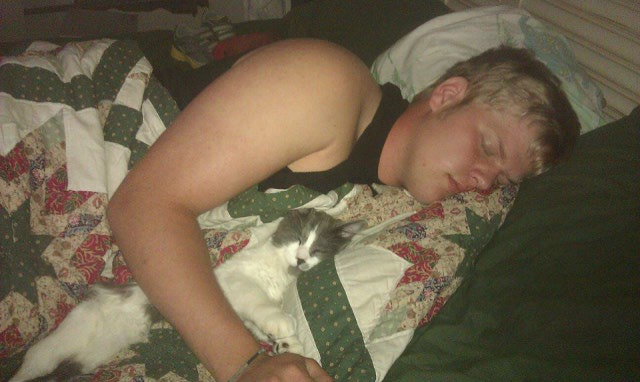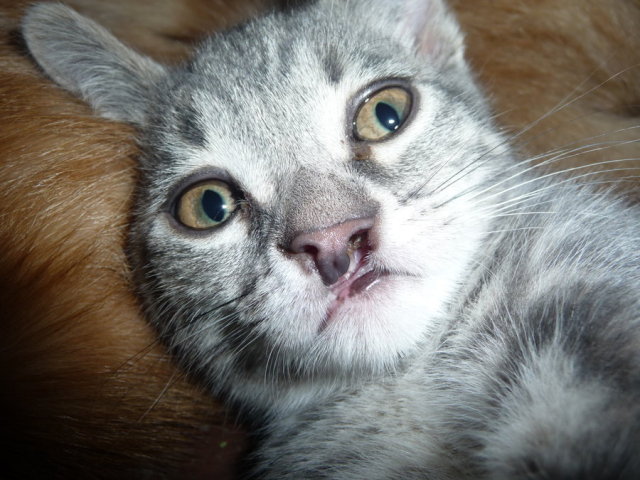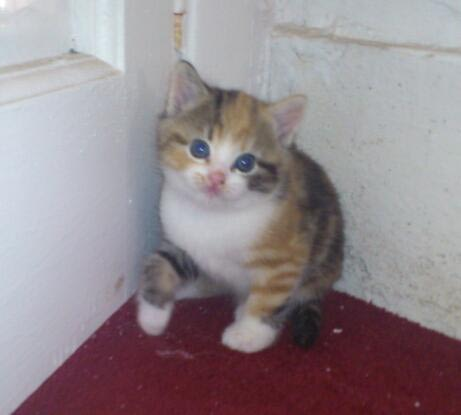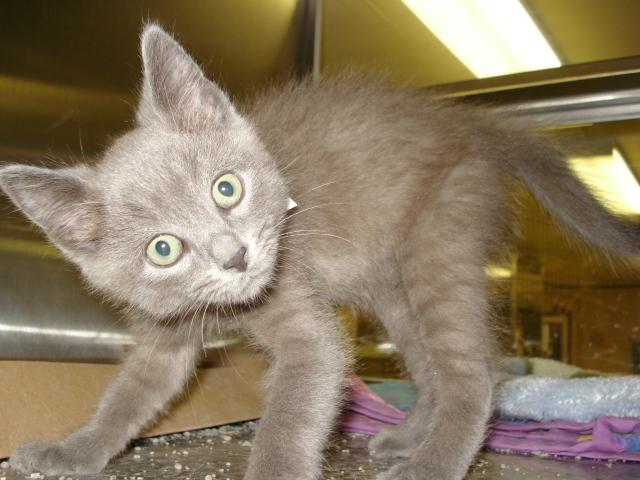QuestionQUESTION: My 9 yr old male cat (who is neutered)will not stop howling at night. As soon as we turn off the lights he starts. He has always been a "talker" but it is getting worse, and I'm not getting any sleep i might add. Is their anything i can buy to give him at night. Thank you...
ANSWER: Renee,
I have three suggestions that might help you to get a bit more sleep at night. I would strongly suggest that you consider having your cat assessed by a holistic veterinarian to see if there is anything that can be done with a non pharmaceutical approach. A holistic vet is trained in conventional medicine as well as one or more alternative therapies which may include homeopathy, acupuncture or massage. My family vet is a fantastic holistic vet, she treats my cats with a combination of conventional medicine and homeopathy and I've seen some amazing results in my cats when the right remedy is given at the right time. It's best to rule out any physical illnesses commonly found in middle aged cats before assuming that the problem is purely behavioral. Sometimes medical issues can manifest themselves in changes of behavior, obviously your cat hasn't always cried during the night. I do think that it would be wise to first rule out any medical conditions and then move on towards treating the problem by trying simple, inexpensive solutions.
Treating your cat with a non-pharmaceutical approach is better for your cat's overall long term health and it's often cheaper than using tranquilizers, anti-anxiety/depressant drugs. If you opt only for the conventional approach it's quite possible that your cat will be prescribed powerful anti-anxiety/depressant drugs or sedatives and if that alone doesn't fix the problem you will probably be referred to a behaviorist. The use of powerful mood altering drugs isn't without risks or side effects. We've all had occasion to read the information leaflet that comes with any type of prescription medication. Unfortunately there isn't any way of knowing whether your cat will experience side effects or adverse reactions if placed on these drugs. I try my best to keep things as natural as possible when caring for cats so I would strongly recommend that you consider trying drug free approaches when it's appropriate. Obviously there are times when treating your cat with prescription drugs is a necessity and a skilled holistic vet has the expertise to guide you and help make the best possible decisions for your cat's long term health.
Once your vet has ruled out potential medical problems which may be causing or contributing to your cat's nocturnal behavior you can try treating your cat with different drug free treatments. One safe general purpose homeopathic remedy that may help is called Bach's Rescue Remedy, this is a blend of flower essences designed to calm and reassure. Rescue Remedy is a safe alternative to medication when it comes to treating people and pets that have been abused, abandoned, injured or traumatized. I have seen some spectacular results after treating cats with Rescue Remedy, in some cases a hopeless cat was turned around and able to live out their life in a loving forever home. Rescue Remedy isn't a miracle cure by any means if your cat isn't being excessively vocal because he's anxious or fearful you may not see any change in his behavior. Homeopathy doesn't provide instant results, you will have an idea how well any given remedy is working for your cat after administering it for several days. You can usually find Rescue Remedy in health food stores, naturopathic pharmacies, some mainstream pharmacies in the section with vitamins and nutritional supplements and I believe that this remedy can also be purchased online.
Rescue remedy comes in two forms which may be useful to treat your cat - drops and a spray. There are two ways to administer the drops. You can add 5-7 drops of Rescue Remedy to a fresh bowl of water each morning for your cat, your cat won't taste it and it can be an effective way of helping to calm an anxious cat. Since cats are very intelligent for the most part and the majority of cats are very observant I would recommend that you don't add the drops to the water bowl in plain view of your cat, I have had cats refuse to drink the water if they've watched me adding a remedy to the bowl. A more direct way to administer Rescue Remedy would be to gently massage one drop into the fairly bald patch of skin in front of your cat's ears 3-4 times a day. It's very important to avoid getting Rescue Remedy into your cat's ears because the flower essences are preserved in a grape alcohol solution which can sting. I don't recommend giving Rescue Remedy directly by mouth because most cats aren't fussy about the taste because of the grape alcohol, putting the remedy directly into food is unlikely to be effective for the same reason.
Rescue Remedy is also available in a spray pump which you can use to spray your cat's bedding or other areas in the house where he spends a fair amount of time. You can use the spray throughout the house before starting your bedtime routines to see if that will make any difference in this kitty's nighttime behavior. This remedy is safe, it's not something that would cause a toxic overdose. In my experience Rescue Remedy is quite useful in situations where you either don't know the cause of a fearful or anxious behavior, it's also a safe and appropriate place to start with homeopathic treatments for your cat.
Having a holistic veterinarian care for your cat will be slightly different from how a vet trained only in conventional medicine will do things. You'll notice that a holistic vet asks specific questions about the cat's habits, demeanor, appetite, routines, etc. The reason that a holistic vet is so much more thorough is so that s/he is able to have a complete understanding of your cat and what treatments are most likely to help him recover. A holistic vet appointment may be a bit longer, but I can say from experience it's well worth it, some amazing things can happen when a cat receives the appropriate treatment at the right time.
I wanted to mention that it would be wise to take some time to talk with other members of the household to see if anyone can shed some light on what might be causing your kitty to be excessively vocal at night. It's a good idea to take some time to think about whether or not there have been any recent changes in your household. Sometimes the only way to cure a problem is to find out what events led up to a specific behavior. I wouldn't rule out things like loud noises that may have scared your cat at night, accidentally startling or injuring your cat when the house was dark and everyone had gone to bed. If you've recently lost another cat (or any pet for that matter) it's possible that your cat is searching for his lost companion and trying to find him.
If you aren't able to think of anything concrete that may have caused your cat to start meowing and keeping the household awake during the night then the next best thing is to try and figure out how to work out a compromise with the cat. For instance, if your cat only meows repeatedly and loudly when it's dark in your home you could try keeping some lights on during the night and gradually reducing the amount of lights left on over time. If your cat is crying because he's calling for you he may stop meowing if you call him to you or bring him to bed with you. As cats age they can have difficulty with sight or hearing so your cat may not be picking up the cues that mean you're heading off to bed for one reason or another. I doubt that the issue is sensory, your cat is a bit young to start losing his memory, hearing or sight, but that's something for a vet to diagnose. My last simple suggestion to try would be to pick up some night lights to plug in throughout the house to see if this makes a difference. It's possible that your cat may have an issue with his sight that makes it difficult to see in low light conditions.
---------- FOLLOW-UP ----------
QUESTION: Thank you for responding quickly. I went out today and got some Rescue Remedy i will try it tonight. Should i just give me a drop, because the bottle says 4 and I'm sure it's intended for humans. also i wanted to add that he is an inside cat only. I appreciate you taking the time to help me. I will let you know if it works. Thanks...
AnswerRenee,
5-7 drops is a pretty standard dose for a cat. Rescue Remedy is completely safe and you don't need to worry about overdosing anyone on this remedy. I've given some tough cases far more than 5-7 drops of Rescue Remedy in a day with no negative effects. You should find that if Rescue Remedy is the right remedy for your cat he should settle down and become far less vocal at night.

 Sick kitty
Question
Kelso
Hi, I rescued a feral cat who was
Sick kitty
Question
Kelso
Hi, I rescued a feral cat who was
 Cleft Lip
Question
Cleft Lip Kitty
Hi Ali,
I have a cat thats 11
Cleft Lip
Question
Cleft Lip Kitty
Hi Ali,
I have a cat thats 11
 What is the breed of my cats
Question
1st
Hello Ali
Thanx for giving us time to get
What is the breed of my cats
Question
1st
Hello Ali
Thanx for giving us time to get
 is my male kitten a tortoiseshell?
Question
our wee guy our wee guy
Hi,
I am
is my male kitten a tortoiseshell?
Question
our wee guy our wee guy
Hi,
I am
 Rehabilitating aggressive rescue cat!
QuestionA friend of me and my husbands was told a week
Rehabilitating aggressive rescue cat!
QuestionA friend of me and my husbands was told a week